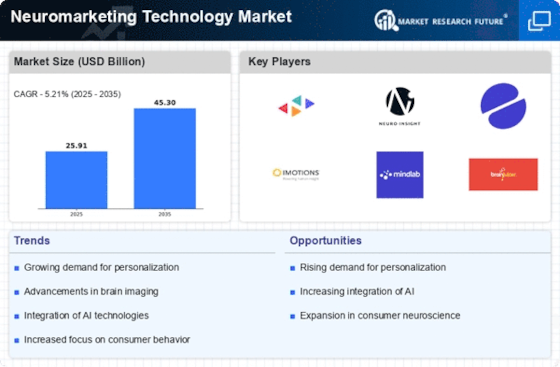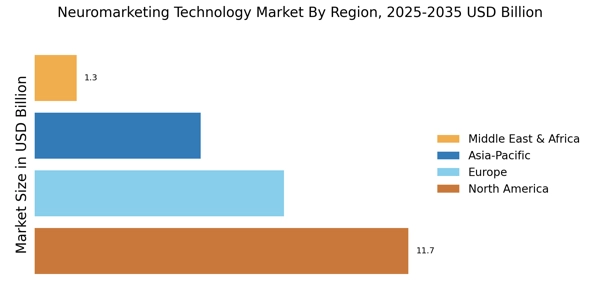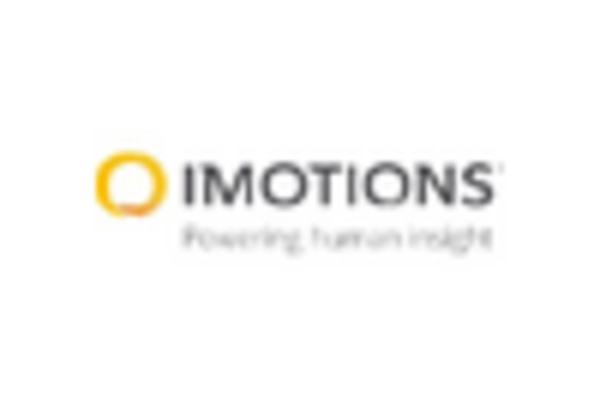Integration of Big Data Analytics
The Neuromarketing Technology Market is experiencing a transformative shift with the integration of big data analytics. As organizations collect vast amounts of consumer data, the ability to analyze and interpret this information becomes paramount. Neuromarketing technologies, combined with big data analytics, enable marketers to uncover patterns and trends in consumer behavior, leading to more informed decision-making. This synergy allows for the development of targeted marketing strategies that resonate with specific audience segments. Market forecasts suggest that the demand for data-driven marketing solutions will continue to rise, prompting businesses to invest in neuromarketing technologies that harness the power of big data. Consequently, companies that effectively leverage these insights are likely to enhance their marketing effectiveness and achieve better outcomes.
Advancements in Neuroscience Research
The Neuromarketing Technology Market is significantly influenced by advancements in neuroscience research. As the understanding of brain functions and consumer behavior deepens, marketers are increasingly adopting neuromarketing tools to decode the complexities of decision-making processes. Innovations in neuroimaging techniques, such as fMRI and EEG, provide valuable insights into consumer preferences and motivations. This scientific approach not only enhances the effectiveness of marketing strategies but also validates the impact of emotional and cognitive factors on purchasing decisions. The integration of neuroscience into marketing practices is expected to grow, with market analysts projecting a steady increase in investments in neuromarketing technologies. This trend suggests that businesses prioritizing neuroscience-based strategies may experience improved marketing outcomes and enhanced consumer relationships.
Rising Demand for Personalized Marketing
The Neuromarketing Technology Market is witnessing a notable increase in demand for personalized marketing strategies. As consumers become more discerning, businesses are compelled to tailor their offerings to meet individual preferences. Neuromarketing technologies, such as eye-tracking and facial coding, enable marketers to gain insights into consumer behavior and emotional responses. This data-driven approach allows for the creation of highly targeted campaigns, enhancing customer engagement and satisfaction. According to recent estimates, the market for personalized marketing is projected to reach substantial figures, indicating a robust growth trajectory. Companies leveraging neuromarketing techniques are likely to gain a competitive edge, as they can effectively connect with their audience on a deeper level, fostering brand loyalty and driving sales.
Growing Importance of Consumer Experience
The Neuromarketing Technology Market is increasingly focused on enhancing consumer experience. As competition intensifies, businesses recognize that delivering exceptional experiences is crucial for retaining customers. Neuromarketing technologies facilitate the measurement of emotional responses and cognitive engagement, allowing companies to refine their customer interactions. By understanding how consumers perceive and react to various stimuli, brands can optimize their marketing efforts to create memorable experiences. Recent studies indicate that companies prioritizing customer experience are likely to see a significant return on investment, with some reporting increases in customer retention rates. This growing emphasis on consumer experience is expected to drive the adoption of neuromarketing technologies, as businesses seek to differentiate themselves in a crowded marketplace.
Emergence of Virtual and Augmented Reality
The Neuromarketing Technology Market is witnessing the emergence of virtual and augmented reality (VR and AR) as powerful tools for engaging consumers. These technologies offer immersive experiences that captivate audiences and create lasting impressions. By utilizing VR and AR, marketers can simulate real-life scenarios, allowing consumers to interact with products in innovative ways. This experiential marketing approach not only enhances brand recall but also fosters emotional connections with consumers. As the adoption of VR and AR continues to grow, market analysts predict a corresponding increase in the integration of these technologies within neuromarketing strategies. Companies that embrace this trend may find themselves at the forefront of consumer engagement, as they leverage immersive experiences to differentiate their offerings in a competitive landscape.

















